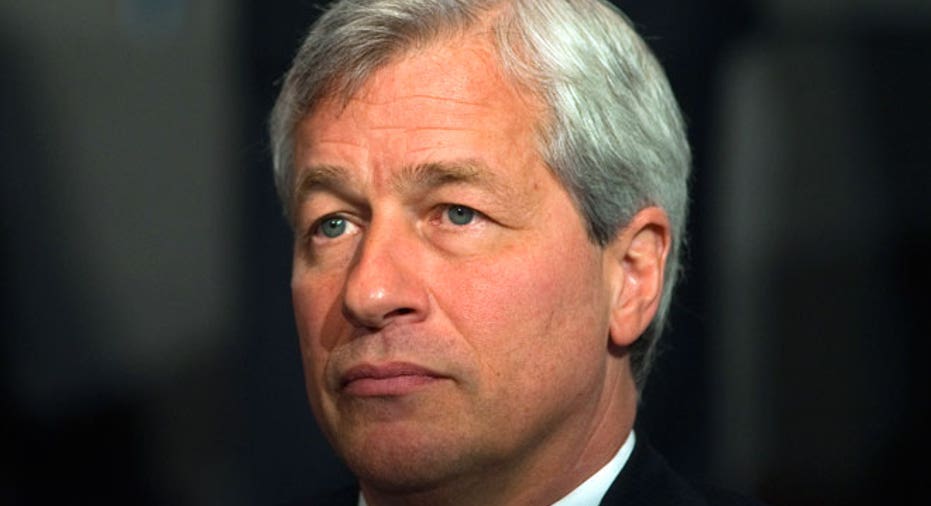Jamie Dimon leaves Wall Street perch to have a say in Washington

JPMorgan Chase & Co Chief Executive Jamie Dimon is starting to look like Corporate America's shadow president.
The 61-year-old banker has made more than a dozen trips to Washington so far this year to press a broad agenda with a range of influential policymakers, people who attended the meetings or are familiar with his schedule said. Dimon has already visited the nation's capital four times as much as he does in a typical year.
His ramped-up presence comes after taking the helm of the Business Roundtable, a lobbying group that represents CEOs of large U.S. companies, in December.
"We couldn't ask for a more engaged or more effective Business Roundtable chair," said Joshua Bolten, former chief of staff for President George W. Bush, whom Dimon installed as the organization's president and CEO.
The frequency of his trips, and the wide range of policies he has been discussing, have started chatter among power brokers in Washington and on Wall Street about how much energy Dimon is devoting to issues beyond JPMorgan.
At times, they said, Dimon carries himself more like someone running the country than someone running a bank.
"If you're Jamie Dimon, you've always had access," said Tim Pawlenty, CEO of the Financial Services Roundtable, a Wall Street trade group. "The difference is, now he wants it. He wants to play a role in policy more broadly than just representing his company."
Dimon has said in the past that the only big job he would want would be U.S. president, but also said running for office would be impractical. Associates told Reuters he has abandoned the idea entirely, and only became more active in Washington because he was worried about his bank, the economy and the future of the country.
A JPMorgan spokesman declined to comment or make Dimon available for an interview. Reuters spoke to over a dozen people who have interacted with Dimon in Washington or were briefed on his meetings. Most spoke on the condition of anonymity because they were not authorized to publicly discuss his activities.
Those who have met Dimon recently include Republican Senate Majority Leader Mitch McConnell, Democratic Senators Sherrod Brown and Mark Warner, Rep. Patrick McHenry, who is a member of House Republican leadership, National Economic Council Director Gary Cohn and Federal Reserve Chair Janet Yellen.
FAMILIAR SIGHT
He was around so much during the summer that Washington regulars said it was no longer surprising to see Dimon pop out of the Capitol Hill subway system or leave a lawmaker's office. He has joked with staff about getting a condominium in Washington because of how often he travels there, one person said.
Although Dimon's meetings typically center on topics like tax reform or financial rules, he is not shy about weighing in on issues ranging from immigration to education and criminal justice reform, those familiar with the discussions said.
In meetings, he has been using an app he asked Business Roundtable staff to build. It allows member CEOs to show how many voters in a district work for their companies, and how many facilities the companies have there, to persuade lawmakers that their priorities are aligned.
During his interactions with lawmakers, Dimon can be brash and expresses annoyance with Congress's inability to advance legislation, people who attended the meetings said.
Sometimes he would show his lighter side.
One day in July, Dimon spotted his Democratic Senator Richard Durbin, an old foe who championed a rule that slashed debit card fees and which Dimon has called "downright idiotic."
Durbin was withdrawing money from a non-Chase ATM when Dimon approached from behind and quipped: "We welcome competition."
A Durbin representative confirmed the interaction, first described by a Politico reporter in a tweet, took place but declined to elaborate.
Those who have followed Dimon through his career are not surprised that the straight-talking New York banker has become even more outspoken during Donald Trump's presidency.
Associates say he has been shocked by some of Trump's actions, such as abandoning the Paris climate accord, threats to tear up free trade deals, a call for a ban transgender people from the military and ending a program that protects people who were brought into the United States illegally as children from deportation.
Dimon is not the only corporate boss venturing outside his usual terrain. Goldman Sachs Group Inc CEO Lloyd Blankfein has criticized Trump in tweets, while others including Apple Inc CEO Tim Cook and Merck & Co CEO Ken Frazier have condemned the president's actions in public statements.
But Dimon, who often refers to himself as a "patriot," differs in tone and demeanor, sources said.
The table of contents for his April letter to shareholders includes categories such as "The United States of America is truly an exceptional country," and devoted more space to public policy prescriptions than in prior years.
After Trump said "both sides" were to blame for the violence between white supremacists and left-wing protesters in Virginia, Dimon offered unsolicited advice on how a president should carry himself.
"It is a leader's role, in business or government, to bring people together, not tear them apart," he wrote in an employee memo.
(Reporting by Pete Schroeder in Washington and David Henry in New York; Additional reporting by Patrick Rucker in Washington and Olivia Oran in New York; Editing by Lauren Tara LaCapra and Tomasz Janowski)



















